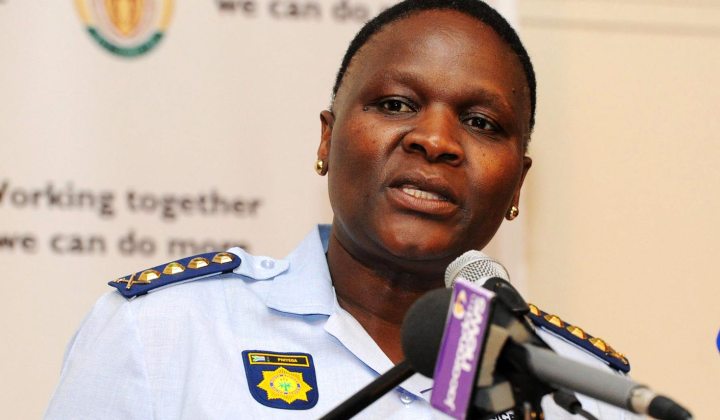South Africa
Marikana Commission: Phiyega continues to play dumb

National police commissioner Riah Phiyega continued to provide unsatisfactory answers to pretty straightforward questions about her role in the 16 August 2012 operation in Marikana that led to the death of 34 people at the hearing – a theme that has run through her entire period in the witness stand. On Tuesday, some protesters showed they’d had enough. By SIPHO HLONGWANE.
The Rustenburg Civic Centre was home to an awkward exchange that would repeat itself over and over again: Marikana community members would shuffle quietly into the hall alongside men and women from the South African Police Service that they were hoping to accuse of gross criminal acts such as murder and torture. From the hilltop on which the building sits, you can look east and see several mines in the distance – a constant reminder of just how close the bloodshed and tears are. As people who had just days earlier clashed (sometimes police and the Marikana community, sometimes rival union members) sat together at the Commission, I wondered how long it would take before the strife that had definitely not ended was brought to the arena where President Jacob Zuma decreed last year that it should be decided.
It didn’t take long. The questionable testimony of police commissioner Riah Phiyega last week and on Monday was enough to galvanise several people to protest outside the building where the Commission is taking place. The people accused the police of murder in Marikana. Bizarrely, the police reacted by seizing placards that the group were holding up.
Marikana Support Campaign spokesman Rehad Desai said the protesters had been angered by the “evasive” evidence being given to the inquiry by Phiyega.
It wasn’t just activists who were put out by Phiyega’s testimony. The Commission’s evidence leader Mbuyiseli Madlanga, on several occasions in his lengthy cross-examination of the commissioner, expressed exasperation at her apparent ignorance of a complex operation that she green-lighted.
For example, it has been a sore point that the police had large gaps in the radio communication as the operation unfolded, which may have perhaps cleared up the question of the police’s motive for firing upon the miners. Phiyega claimed to have not known about this until later, despite accepting that she was the overall commander of the police, and by her own admission very interested in the goings-on in Marikana that day. (She was, in fact, on the scene just hours after the killings.) It puzzled the evidence leader and commission chairman Judge Ian Farlam that a ‘commander’ would not have known about a communication problem until after such an operation. Phiyega could not adequately answer why this was so.
Madlanga took great joy out of a statement made by Phiyega on 20 August, saying the actions of the police at Marikana four days earlier “represent[ed] the best of responsible policing”. This could obviously not be said of a ‘disperse and disarm’ operation that had turned so bloody. The evidence leader made the commissioner to look foolish by getting her to admit that the statement smacked of irresponsibility in hindsight because it was made before all the facts were known.
There were plenty of easy wickets for Madlanga. The faulty radio records on the day of the killings? Were they examples of best of responsible policing too? he asked rhetorically.
Another titbit has been police testimony that there was some confusion, and “firing from many directions” on 16 August, which may explain why they were firing on many of the unarmed men. Was this another example of the best of responsible policing?
A simple coup, perhaps, but one that has added to a growing pile of missteps that Phiyega has made at the Marikana Commission.
Last week, she admitted that she was a novice to police work, despite being appointed as the top cop in the country, yet she insisted on taking responsibility for an operation that went badly wrong. She could not answer on what her boss, the minister of police, knew exactly about the operation before it happened. Even as a lay person, this part of her job seemed within easy grasp – surely it was a matter of making a note of some kind every day?
Like last week, Madlanga had difficulty in getting Phiyega to simply admit to anything that could be construed as blame towards the police. She would not be drawn on whether she thought the operation was successful or not, and ended up by offering that success was relative as the outcome was disrupted.
An important admission by Phiyega is the one that she is basically helped along in her job by the “experienced people” surrounding her. It may be important to the allocation of culpability that she tell the Commission who above her knew of the police operation. She was just two months on the job when the worst civilian massacre since the end of Apartheid happened. Phiyega may perhaps save her political seniors by turning this unfortunate fact into a dead-end for the commission, but it is very unlikely to save her. At the very least, she was in command of police that acted beyond their brief to cause death. DM
Photo: National police commissioner Riah Phiyega briefs reporters on their security plan for the upcoming Africa Cup of Nations at a news conference in Centurion on Thursday, 17 January 2013. Picture: GCIS/SAPA
















